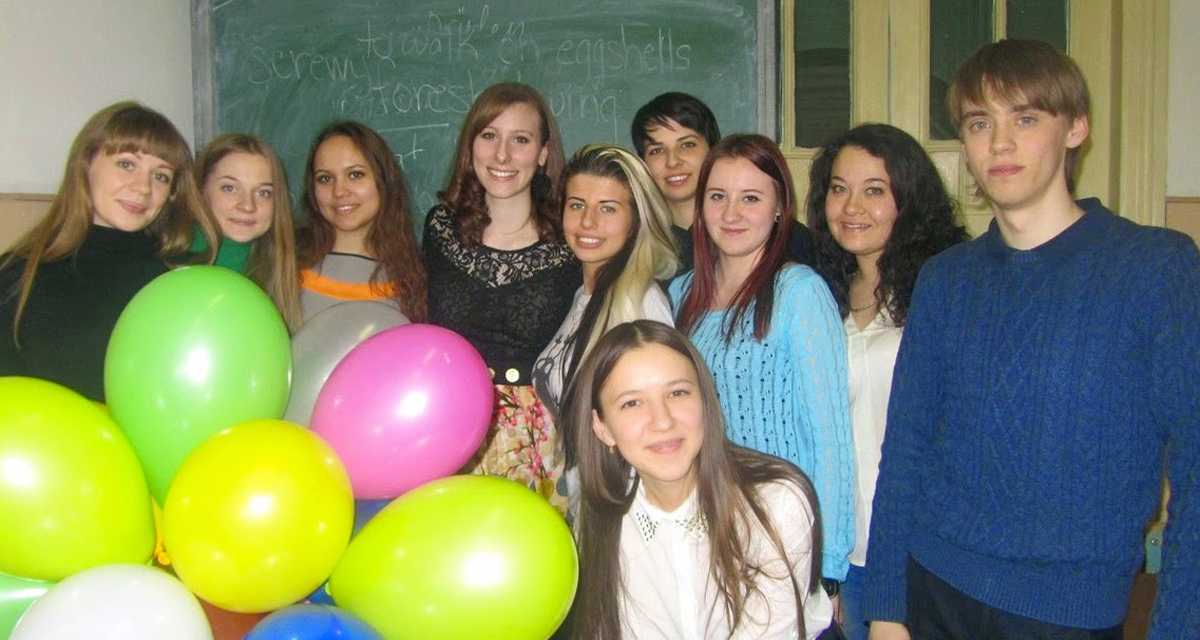Great Expectations
“I approached the teaching from different angle, and I found that it resonated well with my students to encourage them and focus on their strengths instead of their weaknesses.”
Hope Johnson ’13 enters a classroom, 4,676 miles from home. Everyone stands. She looks into the eyes of ten Russian faces, full of expectation. The students are only a year younger than she is, but for the next nine months her task is to acquaint them with the English language at the Elabuga Institute of Kazan Federal University.
The 23-year-old alumna had experienced five previous trips to Russia when the Fulbright Program dropped her off in the small town of Elabuga, within the Republic of Tatarstan, where the population is split 50-50, Russian and Muslim. Fresh out of Gordon and the only young American Protestant for miles, she buffed up on Russian news and TV dramas to ready herself to enter the Russian education system to teach English as a second language.
“The Russian university system is chaotic,” Johnson said. “You have lots of student buying grades instead of earning them. It’s a hard system to come into, having a very different perspective on education in America.”
As she began her first lesson, a student raised her hand and informed Johnson that the class had already covered that material. Instead, she turned the classroom into a space for students to ask questions, which often involved grammar that was not in the textbook. Johnson soon realized that it would be a year of improvising.
Although her approach to education differed from what the Russian students knew, it was profitable in that it contrasted with the system’s shame-based culture. Erring on the side of grace, Johnson credits her time as a Gordon College peer mentor for providing the ability to connect with students by empowering them.
“I approached the teaching from different angle, and I found that it resonated well with my students to encourage them and focus on their strengths instead of their weaknesses,” she said.
Johnson fell in love with Russian culture at age 12 when an exchange student lived with her family in Maine. The student gave Johnson connections with a sister church in Russia, and after a few missions trips there, she discovered her knack for languages. Johnson took night classes to learn the language. Her friends assumed it was merely a passing phase, but she was determined to become fluent.
Although Gordon did not offer a Russian language studies program, Johnson found ways to live out her passion by studying abroad during her sophomore year, through Best Semester. It was on that trip working alongside an English teacher that she realized her love for education.
Despite the differing styles of education, Johnson felt comfortable with the language and culture, and confident in her teaching abilities. The real challenge, she says, was loneliness. Trips abroad generally include groups and peers, which creates an environment of empathy and solidarity, she said. However, Johnson found herself alone for this trip, and her only encounter with a Protestant church was a manipulative and spiritually unhealthy parish.
“The hardest thing wasn’t teaching, but dealing with loneliness and trying not to let it get me down,” she said. “The first three or four months I didn’t have friends or a church community, which was difficult after being at Gordon and growing up in a Christian family.”
Though most advised Johnson to resist calling home too often, so that she could immerse herself in the full foreign experience, she decided that in order to be in the moment, she needed the emotional stability of calls home. In addition, she connected with other Fulbright teaching assistants through Skype. Soon she made two close friends: a fellow American scholar living an hour away, and a secretary at a university.
Johnson cites a proverb that she found to ring true: “Russians are like a coconut—they have a hard shell, but you break through and they have a very soft center. Americans are like a peach—they have a soft exterior, but very hard pits.” It was that sort of enigmatic attitude that first drew Johnson to Russian culture all the way back at 12.
“In Russian culture it is very hard to get to know people,” Johnson said. “They often seem to have cold, harsh exteriors, but once you break through that, which can take a long time, you can make some great friends. I made some pretty deep friendships. I found that there were people who wanted to have deep conversations about life and meaning.”
“It was the mystery of the place that grabbed me at first,” she said. “It was a new place that had such a rich, deep history. People are in tune with souls and emotions in a way that I haven’t seen elsewhere.”
This fall Johnson began work toward an M.A. in Teaching English to Speakers of Other Languages, online through Biola University. She hopes to find an internship in ESL, but ultimately wants to start a night school in Maine for those who would like to learn Russian, she says.
“The experience really confirmed that I this is what I want to do.”
Mary Hierholzer ’16 is a history major and communication arts minor, and Editor-in-Chief of the Tartan. She hopes to study history and political science in graduate school, and to pursue a career in writing for intellectual publications. In the rare moments when Mary is not writing or conducting an interview, she enjoys good conversations, drinking coffee, exploring great literature, admiring art and discovering music.
 The Bell
The Bell